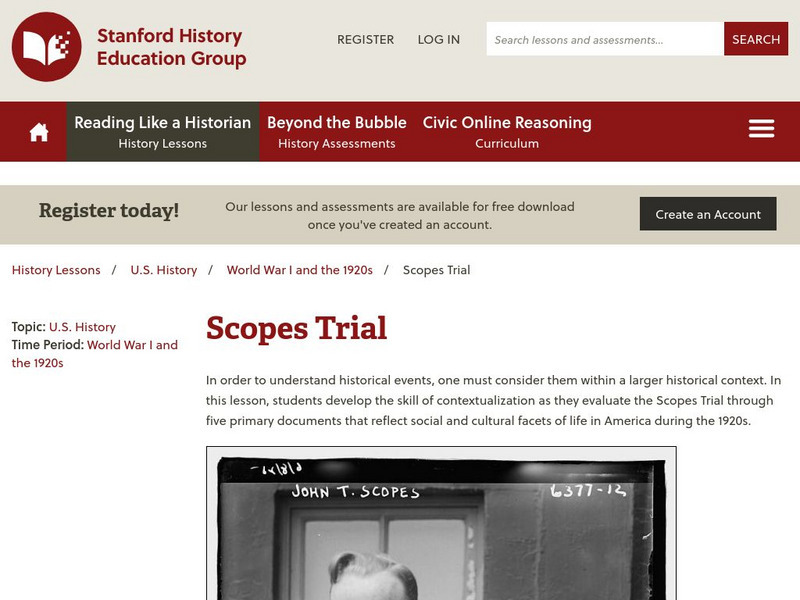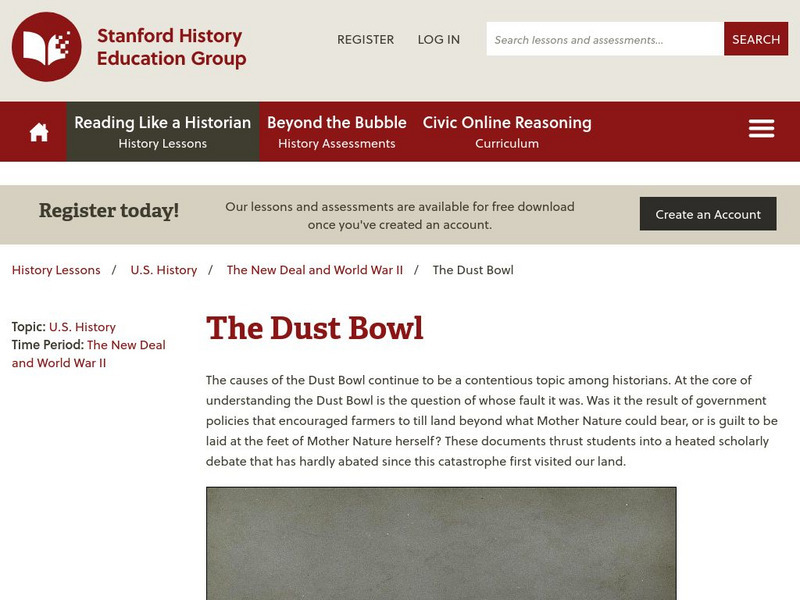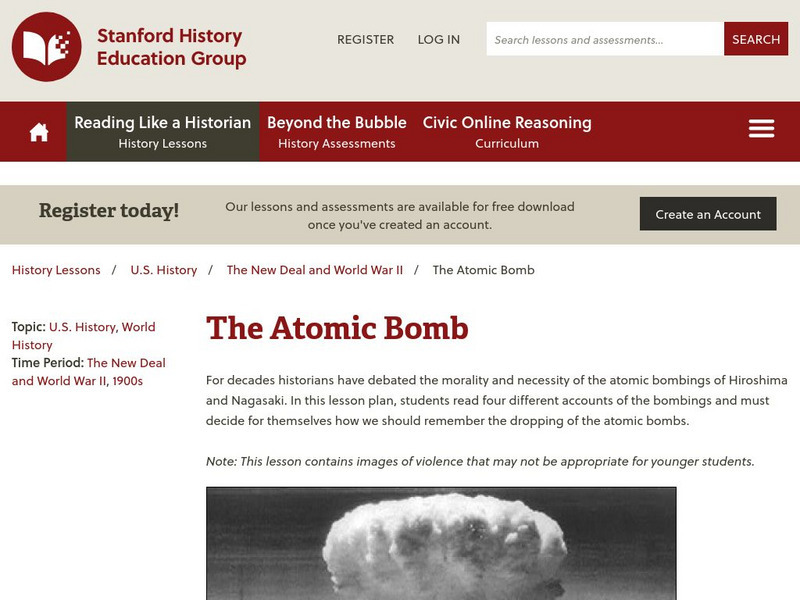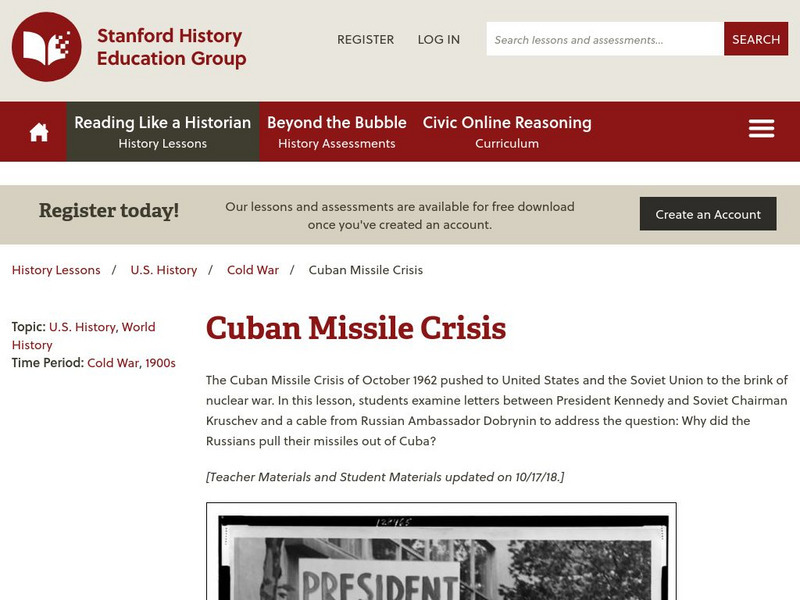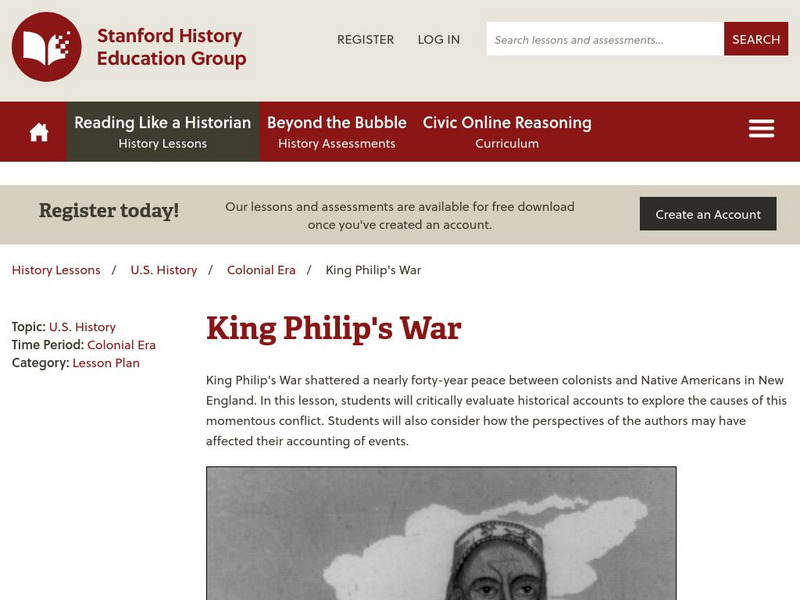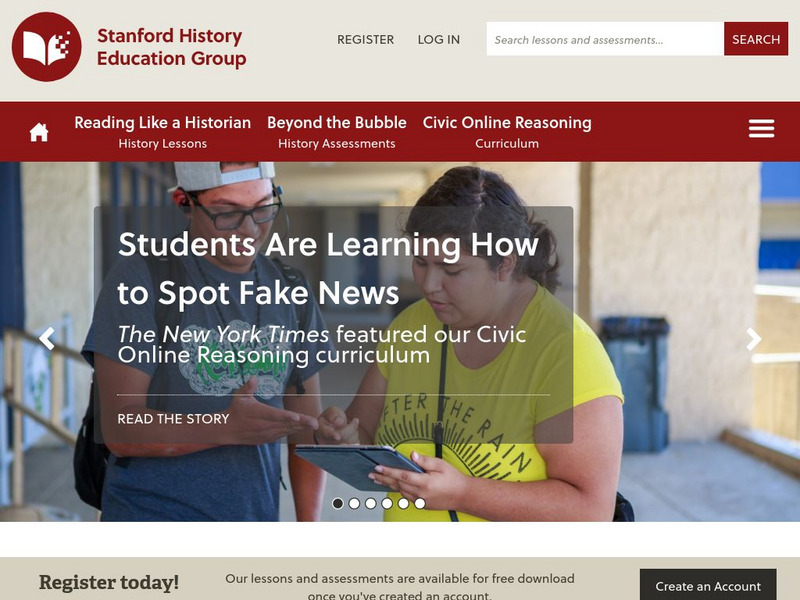Stanford University
Sheg: Document Based History: Reading Like a Historian: Prohibition
[Free Registration/Login Required] Learners read primary source documents to solve a problem surrounding a single historical question. This document-based inquiry lesson allows students to consider the 18th Amendment within the...
Stanford University
Sheg: Document Based History: Reading Like a Historian: Marcus Garvey
[Free Registration/Login Required] Upon review of primary resources provided in this lesson, learners will determine what made Marcus Garvey, leader of the Universal Negro Improvement Association, such a controversial public figure.
Stanford University
Sheg: Document Based History: Reading Like a Historian: Palmer Raids
[Free Registration/Login Required] Examining resources from Palmer and Goldman, students will consider what caused the Palmer Raids after World War I ended. The goal of the Palmer Raids was to incarcerate or deport those left-wing...
Stanford University
Sheg: Document Based History: Reading Like a Historian: Scopes Trial
[Free Registration/Login Required] In 1925, Tennessee lawmakers passed the Butler Act, explaining that teachers were not to discount Creationism in the classroom. Through documents and discussion provided with this lesson, explore how...
Stanford University
Sheg:document Based History: Reading Like a Historian: New Deal and World War Ii
[Free Registration/Login Required] An inclusive unit on the New Deal and World War II with lessons about Social Security, the Zoot Suit Riots, the Dust Bowl, Mexican migration in the 1930s, the atomic bomb, Japanese internment, and the...
Stanford University
Sheg: Document Based History: Reading Like a Historian: Social Security
[Free Registration/Login Required] Take a look at two interpretations of the development of the Social Security program. Also break down the role of government in programs such as taxes and social welfare.
Stanford University
Sheg: Document Based History: Reading Like a Historian: New Deal Sac
[Free Registration/Login Required] A structured academic controversy opportunity to peruse and analyze documents to ignite a debate over the success or failure of the New Deal.
Stanford University
Sheg: Document Based History: Reading Like a Historian: The Dust Bowl
[Free Registration/Login Required] The Dust Bowl of the 1930's in the United States is often a topic of great debate. What caused the phenomenon of storms? Was it the government or Mother Nature or a combination of the two? This lesson...
Stanford University
Sheg: Document Based History: Reading Like a Historian: Zoot Suit Riots
[Free Registration/Login Required] Like other big cities, Los Angeles has had its share of unrest, even riots in some instances. In this lesson, the Zoot Suit Riots of 1943 are investigated to figure out what caused the event.
Stanford University
Sheg: Document Based History: Reading Like a Historian: The Atomic Bomb
[Free Registration/Login Required] How necessary was it for the United States to drop the atomic bombs on Nagasaki and Hiroshima in World War II? In this lesson, students will study varying accounts and develop their own opinions of...
Stanford University
Sheg: Document Based History: Reading Like a Historian: Cuban Missile Crisis
[Free Registration/Login Required] After reviewing documents related to United States and Soviet Union national leadership, students will discuss the reasons Russia extracted their missiles from Cuba.
Stanford University
Sheg: Document Based History: Reading Like a Historian: The Korean War
[Free Registration/Login Required] Students are given an opportunity to look at two textbooks recalling the same event, but one is written in and for North Korean schools and the other in and for South Korean schools. After reviewing the...
Stanford University
Sheg: Document Based History: Reading Like a Historian: Montgomery Bus Boycott
[Free Registration/Login Required] After reviewing four documents, students will consider the deeper meaning behind the bus boycott while studying the Civil Rights Movement in the United States.
Stanford University
Sheg: Document Based History: Reading Like a Historian: Great Society
[Free Registration/Login Required] Lyndon Johnson's Great Society programs, i.e., Medicare and Medicaid, were created in the 1960's to curb poverty and racism. This lesson offers students the opportunity to read about the programs and...
Stanford University
Sheg: Document Based History: Reading Like a Historian: Civil Rights Act of 1964
[Free Registration/Login Required] JFK was known for being supportive of the Civil Rights Movement. In this lesson, students will review two speeches and evaluate the devotion the President had to civil rights.
Stanford University
Sheg: Document Based History: Reading Like a Historian: Soldiers in Philippines
[Free Registration/Login Required] Learners read primary source documents to solve a problem surrounding a historical question. This inquiry lesson allows students to use close reading skills to read a variety of primary source...
Stanford University
Sheg: Document Based History: Reading Like a Historian: Ibn Battuta
[Free Registration/Login Required] Lesson using primary resources on Ibn Battuta includes lesson plan, PowerPoint, graphic organizer, and original documents.
Stanford University
Sheg: Document Based History: Reading Like a Historian: King Philip's War
[Free Registration/Login Required] Lesson in which students analyze original documents to evaluate the conflict between colonists under King Philip and Native Americans.
Stanford University
Sheg: Reading Like a Historian: 1898 North Carolina Election
[Free Registration/Login Required] Lesson using primary resources on the 1898 election in North Carolina during the Gilded Age. Includes handouts, primary sources, and student questions. Requires free registration to access resources.
Stanford University
Sheg: Reading Like a Historian: Settlement House Movement Sac
[Free Registration/Login Required] Lesson using primary sources from Progressive Era about the Settlement House Movement. Includes downloadable teacher materials, student materials, and primary source documents.
Stanford University
Stanford History Education Group: Home
[Free Registration/Login Required] Working with school districts from coast to coast, and as far away as Sweden, Singapore, and Chile, the Stanford History Education Group provides teachers with high-quality resources to enrich students'...
Annenberg Foundation
Annenberg Learner: Interactives: Historical and Cultural Contexts
This interesting interactive website explains kinds of primary sources and gives you the chance to identify them in some games.
University of California
Uc Berkeley Library: Critical Evaluation of Resources
Questions to ask yourself when determining if a source is reliable. Discusses difference between primary and secondary source. List of reference sources and links to other sites that teach you how to evaluate sources....
Center for Innovation in Engineering and Science Education, Stevens Institute of Technology
Ciese: Historical Treasure Chests
After learning to distinguish between primary and secondary sources, young scholars will examine four primary documents and address a set of questions for each.





